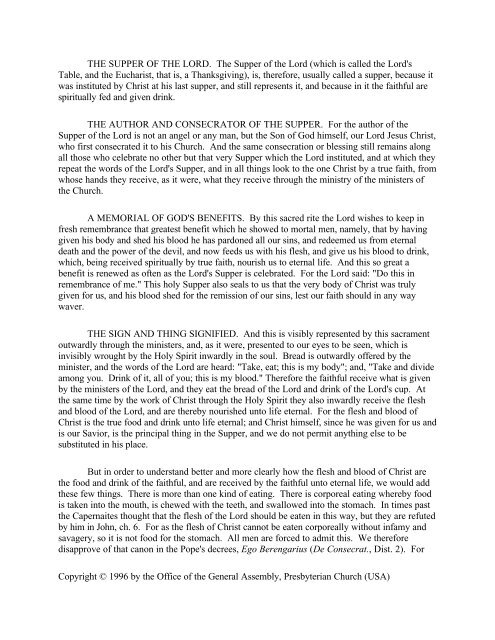The Book of Confessions - The Presbyterian Leader
The Book of Confessions - The Presbyterian Leader
The Book of Confessions - The Presbyterian Leader
You also want an ePaper? Increase the reach of your titles
YUMPU automatically turns print PDFs into web optimized ePapers that Google loves.
THE SUPPER OF THE LORD. <strong>The</strong> Supper <strong>of</strong> the Lord (which is called the Lord's<br />
Table, and the Eucharist, that is, a Thanksgiving), is, therefore, usually called a supper, because it<br />
was instituted by Christ at his last supper, and still represents it, and because in it the faithful are<br />
spiritually fed and given drink.<br />
THE AUTHOR AND CONSECRATOR OF THE SUPPER. For the author <strong>of</strong> the<br />
Supper <strong>of</strong> the Lord is not an angel or any man, but the Son <strong>of</strong> God himself, our Lord Jesus Christ,<br />
who first consecrated it to his Church. And the same consecration or blessing still remains along<br />
all those who celebrate no other but that very Supper which the Lord instituted, and at which they<br />
repeat the words <strong>of</strong> the Lord's Supper, and in all things look to the one Christ by a true faith, from<br />
whose hands they receive, as it were, what they receive through the ministry <strong>of</strong> the ministers <strong>of</strong><br />
the Church.<br />
A MEMORIAL OF GOD'S BENEFITS. By this sacred rite the Lord wishes to keep in<br />
fresh remembrance that greatest benefit which he showed to mortal men, namely, that by having<br />
given his body and shed his blood he has pardoned all our sins, and redeemed us from eternal<br />
death and the power <strong>of</strong> the devil, and now feeds us with his flesh, and give us his blood to drink,<br />
which, being received spiritually by true faith, nourish us to eternal life. And this so great a<br />
benefit is renewed as <strong>of</strong>ten as the Lord's Supper is celebrated. For the Lord said: "Do this in<br />
remembrance <strong>of</strong> me." This holy Supper also seals to us that the very body <strong>of</strong> Christ was truly<br />
given for us, and his blood shed for the remission <strong>of</strong> our sins, lest our faith should in any way<br />
waver.<br />
THE SIGN AND THING SIGNIFIED. And this is visibly represented by this sacrament<br />
outwardly through the ministers, and, as it were, presented to our eyes to be seen, which is<br />
invisibly wrought by the Holy Spirit inwardly in the soul. Bread is outwardly <strong>of</strong>fered by the<br />
minister, and the words <strong>of</strong> the Lord are heard: "Take, eat; this is my body"; and, "Take and divide<br />
among you. Drink <strong>of</strong> it, all <strong>of</strong> you; this is my blood." <strong>The</strong>refore the faithful receive what is given<br />
by the ministers <strong>of</strong> the Lord, and they eat the bread <strong>of</strong> the Lord and drink <strong>of</strong> the Lord's cup. At<br />
the same time by the work <strong>of</strong> Christ through the Holy Spirit they also inwardly receive the flesh<br />
and blood <strong>of</strong> the Lord, and are thereby nourished unto life eternal. For the flesh and blood <strong>of</strong><br />
Christ is the true food and drink unto life eternal; and Christ himself, since he was given for us and<br />
is our Savior, is the principal thing in the Supper, and we do not permit anything else to be<br />
substituted in his place.<br />
But in order to understand better and more clearly how the flesh and blood <strong>of</strong> Christ are<br />
the food and drink <strong>of</strong> the faithful, and are received by the faithful unto eternal life, we would add<br />
these few things. <strong>The</strong>re is more than one kind <strong>of</strong> eating. <strong>The</strong>re is corporeal eating whereby food<br />
is taken into the mouth, is chewed with the teeth, and swallowed into the stomach. In times past<br />
the Capernaites thought that the flesh <strong>of</strong> the Lord should be eaten in this way, but they are refuted<br />
by him in John, ch. 6. For as the flesh <strong>of</strong> Christ cannot be eaten corporeally without infamy and<br />
savagery, so it is not food for the stomach. All men are forced to admit this. We therefore<br />
disapprove <strong>of</strong> that canon in the Pope's decrees, Ego Berengarius (De Consecrat., Dist. 2). For<br />
Copyright © 1996 by the Office <strong>of</strong> the General Assembly, <strong>Presbyterian</strong> Church (USA)




